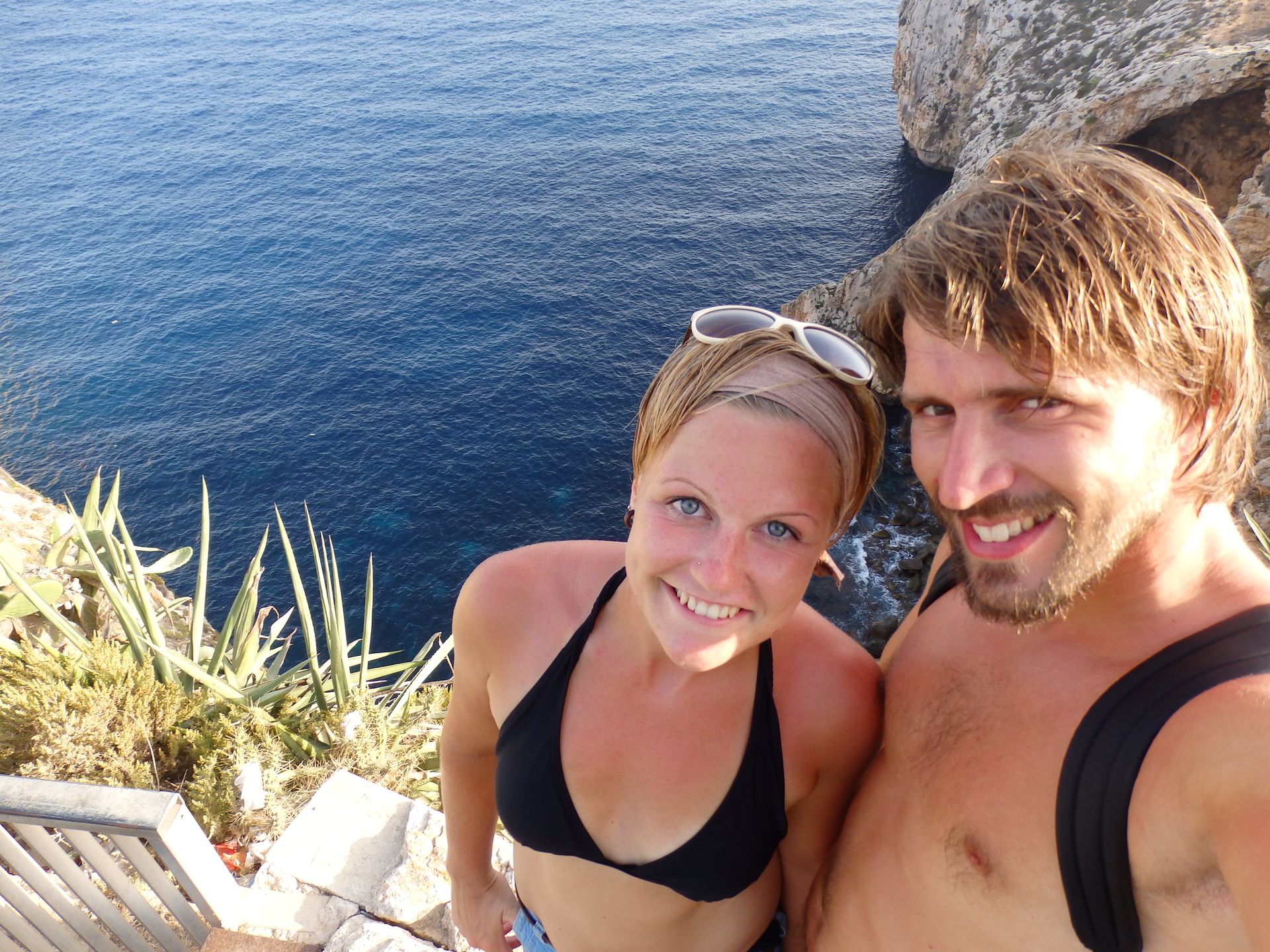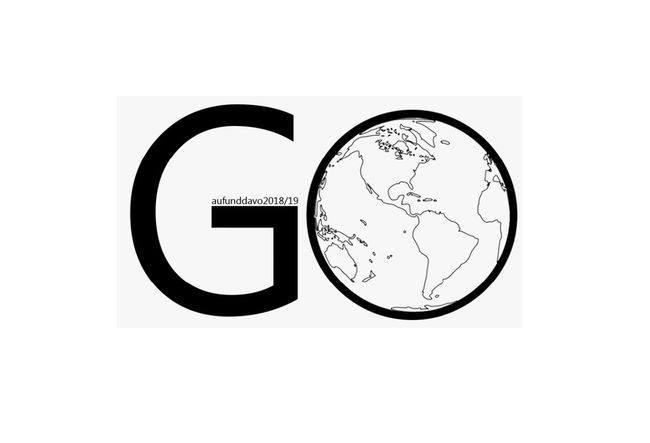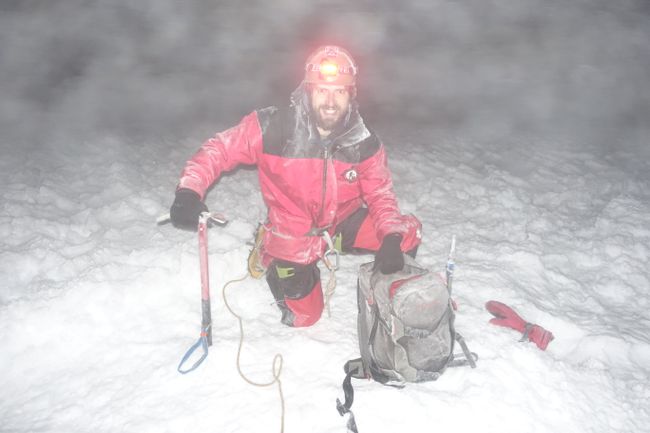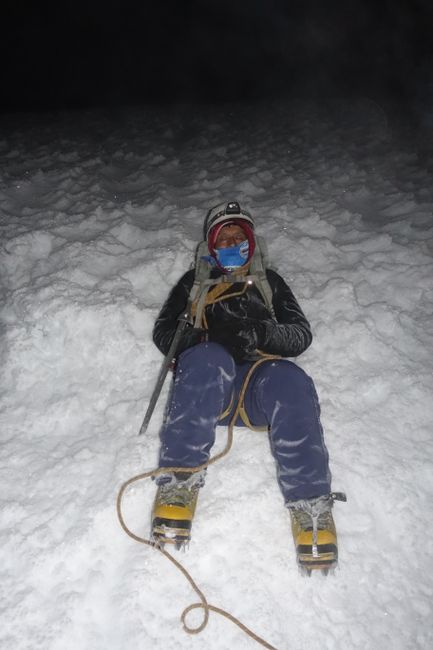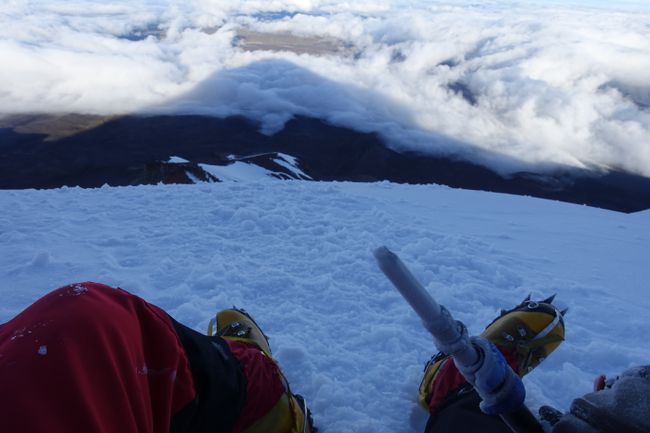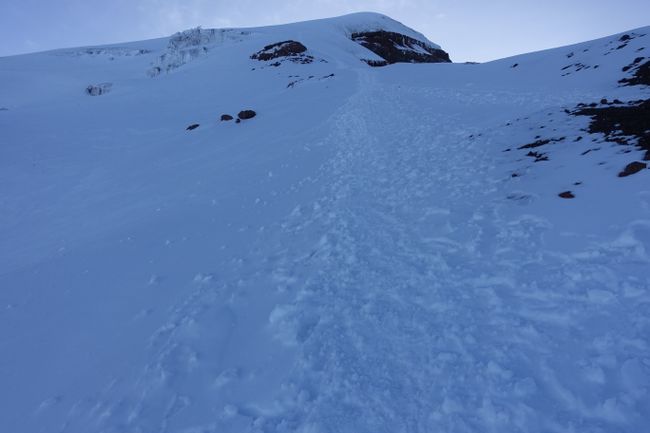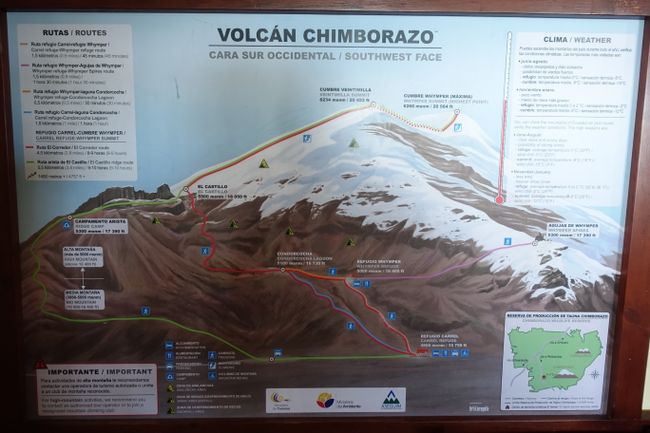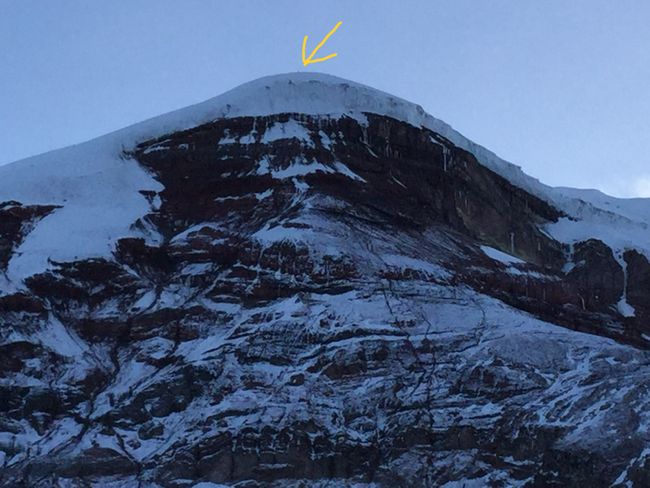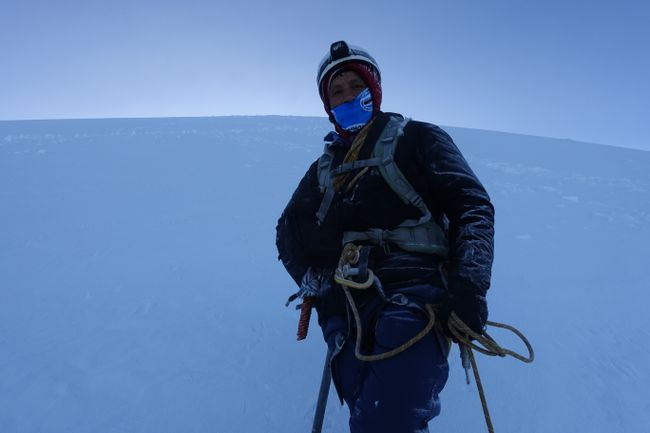Chimborazo 6310m - Second Attempt
発行済み: 11.02.2019
ニュースレターを購読します
Right now I'm sitting on the white sandy beach, listening to the waves and watching Johannes surf in the water. We are now in Montanita and have earned a well-deserved beach vacation, especially Johnny. He made a second attempt to climb Chimborazo. On Monday, February 11, 2019, he watched the sun rise from the highest point on Earth, measured from the center of the Earth. While I stayed in the refuge, it's up to him to tell this story. Now it's time to switch sides: I'm going surfing now, and Johnny has to write!
As the diligent readers of our blog surely know, our first attempt was a bit of a disappointment... Spending $250 for a fraction of the distance and not achieving anything was too little for me.
The decision to try to reach the summit again was not an easy one for me for several reasons:
First of all, the disappointment from the first failed attempt was deep (especially because we felt we were in good shape when we turned back), and seeking comfort on David's couch and escaping to the beach was very tempting... Secondly, I was also extremely unhappy with the thought of having to spend even more money (even more than before) for another attempt, without any guarantee of reaching my desired goal this time.
Therefore, the decision was not an easy one for me. I slept on it for two nights, Googled various companies that offer guided tours to the summit of Chimborazo to compare prices and find local agencies.
Taking all of this into account, my decision to make a second attempt today was based on my disappointment from the first attempt and the "anger" of being so close, as well as logical and geographical reasons... Who knows when I will come to Ecuador again (and have already acclimated myself)? The next sabbatical year will surely come... but when...!?
In addition, my ambition was awakened after the first time, and I would not have forgiven myself if I hadn't tried again in two or three weeks, months, etc.!
So on Thursday, February 7, 2019, we made our way to the city to the travel agencies, and in the last of the three agencies we researched, we found the offer that I liked the most. Professionally planned, with two days in advance at the refuge to acclimate to the altitude, the food, the sleep, and the air pressure!
The latter caused me enormous problems while sleeping on the first night at the refuge (Saturday, February 9th to Sunday, February 10th), so that every time I took a few calm breaths, I struggled for air with a huge gasp because I felt like I couldn't breathe. I followed the tip to drink as much as possible on the day(s) before the tour... unfortunately, with the wrong drink!
NOOOOO! Don't assume the worst... BEER!? It was COCA TEA that contributed to my sleepless first night. Unfortunately, I can't really confirm/assess its effect of helping with the altitude, but I can confirm its stimulating effect, which made my heart race every time I tried to rest.
As a mountaineer, I was advised to only hike from the entrance to the national park on the road to Refugio Caroll (4800m) on the arrival day (Saturday, February 9, 2019)... and maybe a little further; to Refugio Whymper, the Lagoona (just above), or at most to the Whymper-Needles. This was not recommended because it's not advisable to spend the night at the highest point reached on the day...
So I chose the Whymper-Needles (5300m), a few towering rock peaks, in the opposite direction of the ascent to the summit, and after about 1.5 hours, unfortunately in light drizzle and fog, I reached the highest point, a little above the needles... the starting point of a previous summit route (Whymper Route) that can currently not be climbed. Fortunately, I was able to catch a glimpse of the fog clearing and the steep rock face and blue sky above the fog. then returned to the refuge for (delicious) dinner...
On the day of the ascent itself, I was advised to walk around at the altitude in the morning (or hike to Refugio Whymper) for circulation, etc., and then rest completely and go to bed early in the afternoon, as we had set the alarm for 10:00 PM on Sunday evening/night and wanted to start at 11:00 PM.
Well supplied with food and drink in the days before (soup and actually too heavy food —> pork, french fries, salad, chicken wings, rice, ...) and even a - for me completely untypical - reasonable bedtime, we went to bed the day before the ascent.
If I thought that the night at the Rifugio of Iliniza Norte couldn't be surpassed in sleeplessness, I was mistaken. Since we were already in bed at 7:00 PM and it was unexpectedly quiet around us - only one other couple wanted to climb the summit on Saturday and they were already ahead of us - I hoped for at least 12 hours of peaceful sleep. Unfortunately, the exact opposite was the case!
13 hours passed without a single second of sleep! Only the aforementioned coca tea took effect and made me go to the bathroom seven times to relieve myself... it was despairing and made me doubt whether I could even start my planned endeavor in such a sleepless state the following evening!?
Thankfully, I was able to sleep for a few hours in the afternoon on the next day (Sunday, February 10, 2019), but despite all the precautions and equipment checks, I was still quite nervous and excited; the alarm was set for 10:00 PM!
After a warm tea and a few bites of a dry roll with terrible cheese, we stood outside. Liesl had naturally woken up with us, just as nervous as I was, and made sure that I had everything together. A last farewell/start photo of me and my guide (and cook) Juan before our tour, and off we went at 10:48 PM, the scheduled seven to nine hours (with an elevation gain of 1450m) through the so-called "Ruta El Corredor" to the summit - Chimborazo main peak!
Being bundled up, we climbed to Refugio Whymper (5000m) in about 30 minutes, then past Lagoona Condorcocha (5100m). My clothes – I was wearing only a merino long-sleeve under the thick mountain jacket from the agency – were already soaked with sweat here!
In light fog and pitch-black night, we continued up a scree slope through rough debris; the higher we climbed, the more icy and hard the ground became. Shortly after midnight, we couldn't continue like this, and we had to put on our crampons. Isolated snowfields and the scree caused us to slip again and again, and now there was almost only snow and ice terrain ahead of us. Juan also took me on the rope from here, and we formed a two-person rope team for the rest of the way. Equipped better and safer, we continued through the night.
We took the next planned break at El Castillo, at 5500m at 01:10 AM, after 2 hours and 20 minutes. Here, the actual glacier climb began; an endless snow slope with some sections of up to 45° incline (the average gradient is 35-40 degrees) and two small climbing sections up to grade III. (I only saw a few small glacier crevices!)
From here on, it became really difficult for me, and I started to struggle with my breathing. To escape the steepness of the terrain, we trudged through the snow in switchbacks, and soon I needed a short break to catch my breath after every other or every turn.
In our preparatory conversation, John, the boss of the agency I booked with, said... "The only thing that can eventually prevent you from ascending is the onset of high winds!" (except of course human error!) So if it gets very windy, the felt -8°C average temperature near the summit will feel much colder, and the wind will swirl small snow and ice particles...
By 02:45 AM, I already found it to be very windy and insanely cold! Therefore, we put on another (intermediate) layer under the waterproof jacket and also needed additional over-gloves! My fingers were the hardest to warm up, even though just an hour or two earlier, due to the effort, they showed no sign of cold.
Communication between Juan and me was not easy since he didn't understand much English; but we communicated with gestures, and fortunately, I was able to communicate to him that I needed a break when necessary. It only became frustrating when my regular question about how long it would take to reach the summit suddenly changed from the announced 1.5 hours to 2 - 2.5 hours. But we eventually resolved these misunderstandings by using the ice ax to write the time in the snow!
We continued to climb longer, higher, and further, and I really reached my limits when it came to breathing; maybe it was also due to lack of sleep that my strength dwindled more and more?! I don't know! In any case, I have to admit that despite the increasing proximity to the summit, I thought about aborting the tour several times. But since my guide showed no signs of turning back and only asked for my "OK" after taking multiple deep breaths (he got my OK after multiple deep breaths), turning back was not an option!
So at 04:45 AM, we finally reached the first of the two Chimborazo peaks, Veintimilla at 6234m, and I was very glad to be able to rest here for a longer time.
However, due to the strong wind, there was no sense of comfort... so I tried to eat an almost frozen muesli bar with some lukewarm tea and quickly put on my warm gloves again.
Jacket, headlamp, backpack, and even the camera... everything was covered in a layer of ice and frozen solid due to the cold! Nonetheless, Juan and I took pictures of each other and took a joint selfie as if we had all the time in the world; a grateful hug to my guide on my first 6000-meter peak and thanks to heaven that we had made it up here safely could not be missed. The stars were shining incredibly above us!
After this break, I wasn't in better shape, but I was exhilarated by what we had accomplished so far, and we climbed through a saddle into a small depression and uphill again, towards the main summit of Chimborazo, which could only be vaguely seen in the semi-darkness from a distance. Only the North Star shone fantastically bright above the highest point, and the snow reflected the light of our headlamps...
The closer we got to the summit, the denser the fog became... and at 05:30 AM, we finally made it, thank God, and we collapsed into each other's arms... and then into the snow!
We reached the main summit in 6 hours and 40 minutes and now deserved a break at the 6310m high summit - the highest point on Earth (measured from the center of the Earth, even higher than Mount Everest)!
Unfortunately, the increasingly dense high fog or clouds did not allow us to see the valley, and even taking photos proved to be relatively difficult in this mix of cold wind and fog. Since we still had the descent of 2-3 hours ahead of us, Juan did not want to linger at the summit for too long in these conditions and urged me to start the return journey.
Hardly 15 minutes into the descent and almost back at the Veintimilla summit, the weather started to clear up noticeably, and we finally got our long-awaited panoramic and distant views with the first rays of sunshine of the day at 06:15 AM. Cloud formations like cotton candy over the valley in one direction, partially blurred with the snow in front of us, occasional glimpses towards the refuge, and an incomparable play of light and (the oversized) shadow of Chimborazo, which pushed like a huge, unreal, shadowy pyramid over the region below, and which we always had in view while descending! (the summit itself - behind us!)
The route that I found quite challenging on the ascent, which we completed in switchbacks over the icy snow slope, was now, according to guide Juan, supposed to be descended almost straight down... if the snow had been a little softer, the terrain a little less steep, and my knee problems a little less bothersome while descending, it would certainly have been a significant time-saving. But as it was, we had to take breaks every 20 or 30 meters on the way down... and I was "quite happy" about it because I needed moments to catch my breath even on the descent!
So we went down the slope, which sloped gently southwest towards Refugio, with a downhill view directly on Lagoona Condorcocha and Refugios Whymper and Caroll. To our left, the massive, icy southwest wall with some icefalls and stacked layers of earth that looked like they were from the Ice Age.
It's a good thing that the end of the tour was in sight because I had to admit to myself that my strength was slowly running out!
At 08:48 AM, exactly 10 hours later, we reached Refugio Whymper and finally (a little earlier at the Lagoona) the end of the trackless terrain!
Two happy faces looked at each other... Juan's, because I was incredibly happy and grateful that I had almost reached my goal... and mine, because he - I believe - was genuinely happy that he had FINALLY brought me down the last steep meters; I probably cost him an hour and a half during the descent!
In the last half-hour on our way down to Refugio Caroll, I tried to concentrate well on every unevenness, and all the while, I kept recalling the words of "Huberbua" Alex Huber during his visit in March of last year... "You haven't really conquered a mountain until you've safely reached the bottom again!"
Between 09:00 AM and 09:30 AM, we did it! We safely reached our starting point after about 10.5 hours of high-altitude climbing...
Liesl had already suspected that we would come back very soon and walked towards us, walking the last meters to the hut beside us.
Glad, proud, grateful, and exhausted from this fantastic adventure, I went into the hut, rested a bit, and packed our things for the return journey to Riobamba.
Now I was really looking forward to a week of "beach vacation" with sun, warmth, surfing, and, above all, running barefoot and wearing nothing but swim trunks...!
ニュースレターを購読します
答え (3)
Barbara
Wie gebannt hänge ich an euren Berichten ❤️❤️❤️Gabi
Wow , das waren aufregende Wochen ! Nicht nur für euch ! Schee , dass des gschafft hast ! Gott sei Dank ! Freun uns scho auf eure nächsten Berichte !Elisabeth
Wir halten euch selbstverständlich weiter auf dem Laufenden und freuen uns, dass wir euch auf diesem Wege teilhaben lassen können! :)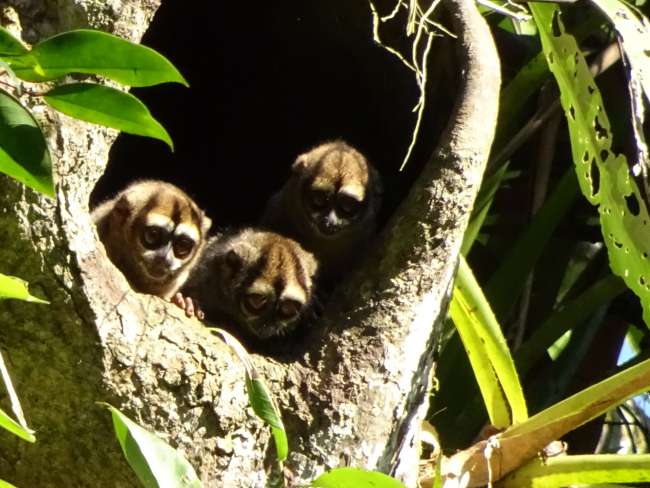
旅行レポートエクアドル
